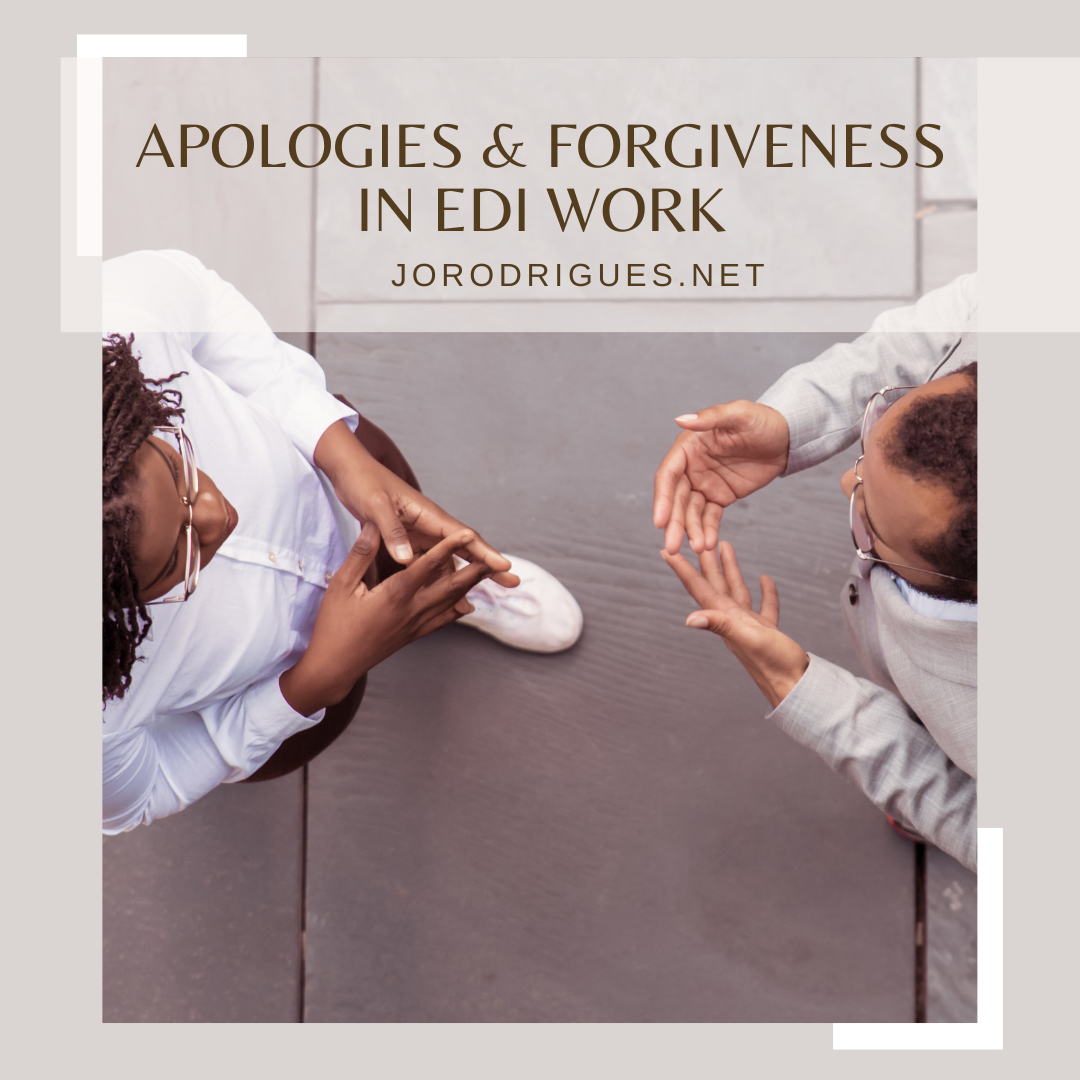What’s not explicitly talked about when organizations embark on work like equity, diversity, and inclusion (EDI) and addressing discrimination are expectations around apologies and forgiveness.
These expectations are linked to 2 major needs by harmed parties (i.e. those who have experienced hurt and suffering) and those trying to stop the harm: accountability and acknowledgment.
Creating healthy work places, healthy inter-personal relationships and conditions where discrimination cannot exist requires both.
One way to demonstrate acknowledgment and accountability is through an apology. Apologies are what many harmed people in the workplace want.
Also wanted is an acknowledgement of the apology. This looks like expressing thanks for the attempt to be accountable because organizations and leaders are actively trying. This usually unnamed want has elements of a need for forgiveness.
The lack of a satisfactory apology or gesture of forgiveness leads to complications, assumptions and conflict – factors contributing to toxicity.
To avoid this, we need to get clearer of what an apology is and what forgiveness is.
This clarity will help dispel myths and assumptions, paving the way for healthy interactions that can lead to positive and substantive change for everyone in the workplace.
What’s an Apology?
For some organizations and leaders, an apology looks like this:
Acknowledgement: We’ve acknowledged there’s a problem.
Action: We are taking measures to address the issue.
These are attempts at taking responsibility for structures that enable toxicity and maintain inequities as well as a lack of diversity and inclusion.
But do these steps fulfill the requirements of an apology?
From research and analysis of different conflicts, the work of clinical psychologist and author of Why Won’t You Apologize, Dr. Harriet Lerner, the recommendations in the the Final Report of the National Inquiry into Missing and Murdered Indigenous Women and Girls and the mediation work I’ve done, here’s what I’ve learned that’s required for an apology.
Requirement 1: Specificity
An apology requires naming the cause and effect of actions taken by the person offering the apology and clearly acknowledging the impact it’s had on the receiving party.
Requirement 2: Meaningful Action
An apology also requires meaningful action. This means getting curious and asking harmed parities what impactful remedies look like as well as following through on implementing them.
Requirement 3: Timeliness
A final requirement for an apology is timeliness. Long, drawn-out actions to address issues for those harmed appear insincere and meaningless.
Harmed parties, like staff who have experienced inequities and discrimination at work, are expecting this type of apology.
A lack of awareness on the organization or leader’s part of these requirements or expectations from harmed parties for an apology will result in conflict and misunderstanding. So will an an unwillingness to recognize these expectations.
In addition, what can intensify the situation is the organization or leader having the unsaid expectation for staff to be grateful for these efforts.
What you get are the perfect conditions to create conflict between employee resource groups and leaders, a culture of “niceness” (pretending issues don’t exist for the sake of “peace”), failed EDI plans and, quiet quitting.
Understanding what’s required for an apology, it is now possible to consider what’s required for forgiveness.
What’s Forgiveness?
The general definitions of forgiveness range from the idea of “letting go” to “radical forgiveness”. Dr. Lerner states that, “[radical forgiveness] does not just involve letting go for the sake of the hurt party. It goes further, recognizing the pain of the wrongdoer and wishing that he or she be happy and well.”
This can feel impossible to do.
Consider consistently being passed over for promotions, being underpaid and undervalued, and/or subject to passive aggressiveness, bullying, harassment, homophobia, ableism, misogyny, racism and other forms of discrimination in the workplace.
In these contexts, can impacted staff recognize the regret (or pain) of the organization or leader for policies, procedures and behaviours they now know have harmed their staff? Can these staff members wish that the organization or leader is happy and well, even when the full requirements for a meaningful apology are not met?
The desire for organizations and leaders to want employees to acknowledge their efforts and let go of the past, because of what is being done now for the future, is complicated. It’s complicated, in part, because of the underlying want to be acknowledged and forgiven.
If organizations and leaders want this then, according to Dr. Lerner, the path to forgiveness, if it can be given, is for the leaders or organizations whose actions caused harm to:
- Check-in consistently with the harmed party
- Let them know they are continuing to reflect on what they have caused
- To take action and
- Check to see if this is the action that is meaningful to the hurt/suffering party.
These are the conditions that may lead to forgiveness from harmed parties.
Should apologies be met with forgiveness?
There are so many named, kinda named, and not named expectations when it comes to building healthy workplace cultures.
An unasked question in all of this is: Should apologies be met with forgiveness?
This is a question that should be asked and requires reflection on an individual, team and organization level.
Why?
Because not reflecting on the requirements and expectations of apologies and forgiveness undermines efforts to address discrimination and build equitable, diverse and inclusive workspaces.
There are no easy answers but what is revealed, if time is taken to answer the questions highlighted in this post, is clarity of where you, your team and your organization are in your EDI journey. And this clarity will give you the information needed for its success.

P.S. Free Webinar: Want support on how to deal with conflict and emotions in Anti-Racism work? Register for my free webinar: How to Manage Conflict and Emotions in Anti-Racism Work.
For those who show up live the last 10 to 15 minutes will not be recorded to create a safe space for Q&As.
For those who can’t make, a replay will be sent after.
P.P.S. Team Training: Is your team ready for the next step? Are they ready to build their skills and resilience for difficult conversations? Are they ready to learn how to mindfully communicate with others for effective and lasting change? If so, let’s talk. Book an info chat with me here. Review my full suite of services here.

